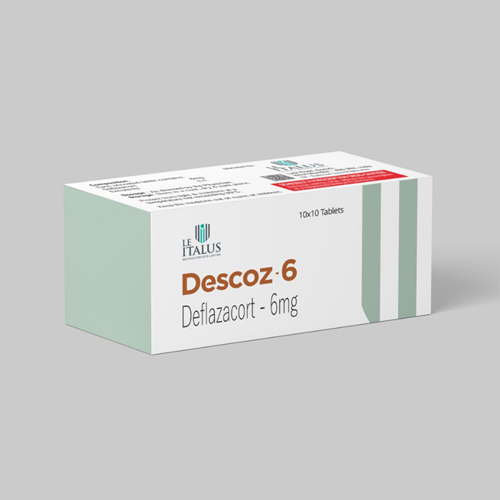Descoz 6

DESCOZ 6
Each Film coated tablet contains
Deflazacort……….. 6 mg
INTRODUCTION
Deflazacort is a synthetic Glucocorticoid and is used to suppress inflammation. It has been proven to having a lower risk of side effects such as bone loss, glucose intolerance or Cushing’s syndrome than other available steroids.
MODE OF ACTION
Glucocorticoid (GC) are widely used for the suppression of inflammation in chronic inflammatory diseases such as asthma, R.A., inflammatory bowel disease and autoimmune diseases, all with increased expression of inflammatory genes.
GC bind to GR in the cytoplasm which then translocate to the nucleus, where they bind to GC response elements (GRE) on GC-responsive genes, resulting in increased transcription for genes coding for anti-inflammatory proteins
GC increases the synthesis of lipocortin-1 that has inhibitory effect on phospholipase A2 and therefore inhibits the production of inflammatory mediators as well as inhibit genes coding for COX-2.
PHARMACOKINETIC PARAMETERS
Absorption: Rapid
Metabolism: Through (enzymes) esterases to the pharmacologically active metabolite (D 21 OH)
Protein binding: 40% T 1/2 : 1.1 – 1.9 hours
Elimination: Urine (70%) & Faeces (30%)
INDICATIONS
Chronic Obstructive Pulmonary Disease
Bronchial Asthma
Rheumatoid Arthritis
Juvenile chronic arthritis
DOSAGE ADULTS
For acute disorders, up to 120 mg/day Deflazacort may need to be given initially. Maintenance doses in most conditions are within the range 3 – 18 mg/day. The following regimens are for guidance only.
Rheumatoid arthritis: The maintenance dose is usually within the range 3-18 mg/day. The smallest effective dose should be used and increased if necessary.
Bronchial asthma: In the treatment of an acute attack, high doses of 48 -72mg/day may be needed depending on severity and gradually reduced once the attack has been controlled. For maintenance in chronic asthma, doses should be titrated to the lowest dose that controls symptoms.
CHILDREN
There has been limited exposure of children to Deflazacort in clinical trials. In children, the indications for Glucocorticoid are the same as for adults, but it is important that the lowest effective dosage is used.
Doses of Deflazacort usually lie in the range 0.25 – 1.5 mg/kg/day.
Juvenile chronic arthritis: The usual maintenance dose is between 0.25- 1.0 mg/kg/day.
Bronchial asthma: The initial dose should be between 0.25 – 1.0 mg/kg Deflazacort on alternate days.
DOSAGE ADJUSTMENT
Hepatic Impairment
In patients with hepatic impairment, blood levels of Deflazacort may be increased. Therefore the dose of Deflazacort should be carefully monitored and adjusted to the minimum effective dose. Renal Impairment: No special precautions
Elderly: No special precautions
Pregnancy and lactation
The ability of corticosteroids to cross the placenta varies between individual drugs; however, Deflazacort does cross the placenta. Corticosteroids are excreted in breast milk, although no data are available for Deflazacort. Doses of up to 50 mg daily of Deflazacort are unlikely to cause systemic effects in the infant.
SPECIAL WARNINGS AND PRECAUTIONS
Hereditary problems of galactose intolerance
Cardiac disease
Gastritis or Esophagitis, ulcerative colitis if there is probability of impending perforation, active or latent peptic ulcer
Diabetes mellitus or a family history,
Osteoporosis
Renal insufficiency.
Liver failure.
Previous corticosteroid-induced myopathy.
Hypothyroidism
ADVERSE EFFECTS
Nausea / Vomiting
Gastritis / heartburn
However the overall adverse events in Deflazacort treated patients was lower than that in Prednisolone & Methylprednisolone recipients.
Cushingoid syndrome
